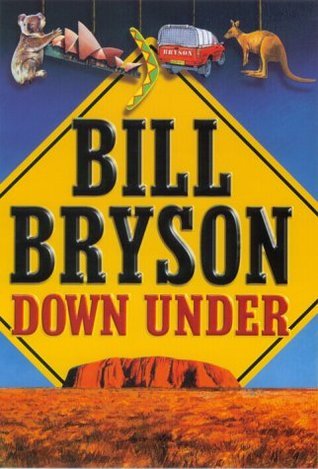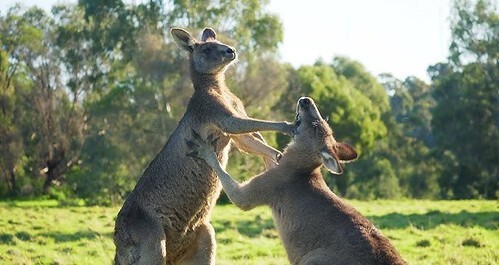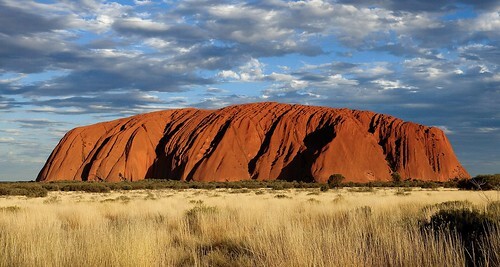What do you think?
Rate this book


For a start, there's the oddly nasty fauna and flora. Barely a page of Down Under is without its lovingly detailed list of lethal antipodean critters: sociopathic jellyfish, homicidal crocs, toilet-dwelling death-spiders, murderous shrubs (yes, shrubs). Bryson's absorbing and informative portrait is of a terrain so intractably vast, a land so climatically extreme, it seems expressly designed to daunt and torment humankind.
This very user-unfriendliness throws up another Aussie paradox. If the country is so hostile how come the natives are so laid back, so relaxed? As Bryson shuffles from state to state, he seeks the key to the uniquely cool Australian character and finds it in Australia's tragicomic past, her genetic seeding of convicts, explorers, gold diggers, outlaws. This is a country of lads and mates, of boozy gamblers--nowadays mellowed by sunshine and sporting success.
Down Under is a fine book. So it may not be quite as deliciously malicious as Bryson's The Lost Continent, nor as laugh-out-loud funny as Neither Here Nor There. But so what? A Bill Bryson on cruise control is better than most travel writers on turbodrive. --Sean Thomas
319 pages, Hardcover
First published January 1, 2000
“It has more things that will kill you than anywhere else. Of the world's ten most poisonous snakes, all are Australian. Five of its creatures—the funnel web spider, box jellyfish, blue-ringed octopus, paralysis tick, and stonefish—are the most lethal of their type in the world. This is a country where even the fluffiest of caterpillars can lay you out with a toxic nip, where seashells will not just sting you but actually sometimes go for you. Pick up an innocuous cone shell from a Queensland beach, as innocent tourists are all too wont to do, and you will discover that the little fellow inside is not just astoundingly swift and testy but exceedingly venomous. If you are not stung or pronged to death in some unexpected manner, you may be fatally chomped by sharks or crocodiles, or carried helplessly out to sea by irresistible currents, or left to stagger to an unhappy death in the baking outback. It's a tough place.”
“There was no place in the world like it. There still isn't. Eighty percent of all that lives in Australia, plant and animal, exists nowhere else. More than this, it exists in an abundance that seems incompatible with the harshness of the environment. Australia is the driest, flattest, hottest, most desiccated, infertile, and climatically aggressive of all the inhabited continents. (Only Antarctica is more hostile to life.) This is a place so inert that even the soil is, technically speaking, a fossil. And yet it teems with life in numbers unaccounted.”
“Australians are very unfair in this way. They spend half of any conversation insisting that the country’s dangers are vastly overrated and that there’s nothing to worry about, and the other half telling you how six months ago their Uncle Bob was driving to Mudgee when a tiger snake slid out from under the dashboard and bit him on the groin, but that it’s okay now because he’s off the life support machine and they’ve discovered he can communicate with eye blinks.”
“It’s not even possible to say quite where the outback is. To Australians anything vaguely rural is “the bush.” At some indeterminate point “the bush” becomes “the outback.” Push on for another two thousand miles or so and eventually you come to bush again, and then a city, and then the sea. And that’s Australia.”
No one knows, incidentally, why Australia's spiders are so extravagantly toxic; capturing small insects and injecting them with enough poison to drop a horse would appear to be the most literal case of overkill. Still, it does mean that everyone gives them lots of space.What an absolutely stunning endorsement. As with his other traveling books, Bill Bryson hip hops his way across a country - visiting monuments and interviewing natives.
They spend half of any conversation insisting that the country's dangers are vastly overrated and that there's nothing to worry about, and the other half telling you how six months ago their Uncle Bob was driving to Mudgee when a tiger snake slid out from under the dashboard and bit him on the groin, but that it's okay now because he's off the life support machine and they've discovered he can communicate with eye blinks.To be fair, Bill Bryson does have plenty of good things to say about Australia. As he goes from town to town, he describes delicious sounding dishes and has a way with describing the atmosphere such that you feel like you are really there.
There was no place in the world like it. There still isn't. Eighty percent of all that lives in Australia, plant and animal, exists nowhere else. More than this, it exists in an abundance that seems incompatible with the harshness of the environment. Australia is the driest, flattest, hottest, most desiccated, infertile, and climatically aggressive of all the inhabited continents. (Only Antarctica is more hostile to life.) This is a place so inert that even the soil is, technically speaking, a fossil. And yet it teems with life in numbers unaccounted. For insects alone, scientists haven't the faintest idea whether the total number of species is 100,000 or more than twice that. As many as a third of those species remain entirely unknown to science. For spiders, the proportion rises to 80 percent ... This is a country that is at once staggeringly empty and yet packed with stuff. Interesting stuff, ancient stuff, stuff not readily explained. Stuff yet to be found. Trust me, this is an interesting place.
"Is it dangerous?" I asked.
Now, before we hear Deirdre's response to me as I stood there, vulnerable and abraded, shivering, nearly naked and half drowned, let me just quote from her subsequent article in the Herald's weekend magazine: While the photographer shoots, Bryson and his boogie board are dragged 40 meters down the beach in a rip. The shore rip runs south to north, unlike the rip further out which runs north to south. Bryson doesn't know this. He didn't read the warning sign on the beach.* Nor does he know about the bluebottle being blown in his direction — now less than a meter away — a swollen stinger that could give him 20 minutes of agony and, if he's unlucky, an unsightly allergic reaction to carry on his torso for his life.
"Dangerous? No," Deirdre replied now as we stood gawping at the bluebottle. "But don't brush against it."
"Why not?"
"Might be a bit uncomfortable."
I looked at her with an expression of interest bordering on admiration. Long bus journeys are uncomfortable. Slatted wooden benches are uncomfortable. Lulls in conversations are uncomfortable. The sting of a Portuguese man-of-war — even Iowans know this — is agony. It occurred to me that Australians are so surrounded with danger that they have evolved an entirely new vocabulary to deal with it.
*Footnote: The statement is inarguable. However, the author would like the record to show that he did not have his glasses on; he trusted his hosts; he was scanning a large area of ocean for sharks; and he was endeavoring throughout not to excrete a large house brick into his pants.








